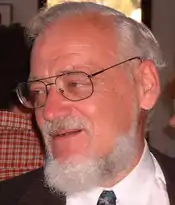Brian Skyrms
Brian Skyrms (born 1938) is an American philosopher, Distinguished Professor of Logic and Philosophy of Science and Economics at the University of California, Irvine, and a professor of philosophy at Stanford University. He has worked on problems in the philosophy of science, causation, decision theory, game theory, and the foundations of probability.

Education and career
Skyrms graduated from Lehigh University in 1960 and earned his Ph.D. in philosophy from the University of Pittsburgh in 1964. He taught at several different universities, before teaching at the University of Illinois, Chicago from 1968 until 1980, when he moved to the University of California, Irvine.[1]
Skyrms is a Fellow of the American Academy of Arts & Sciences and one of two living philosophers (along with Allan Gibbard) to be elected a Fellow of the National Academy of Sciences.
Philosophical work
Most recently, his work has focused on the evolution of social norms using evolutionary game theory. His two recent books Evolution of the Social Contract [2] and The Stag Hunt [3] are both on this topic. These books use arguments and examples from evolutionary game theory to cover topics of interest to political philosophy, philosophy of social science, philosophy of language, and the philosophy of biology.
Books
- Ten Great Ideas about Chance (with Persi Diaconis, Princeton University Press, 2018)[4]
- Social Dynamics, Oxford University Press 2014.
- Signals: Evolution, Learning, and Information, Oxford University Press 2010[5]
- The Stag Hunt and the Evolution of Social Structure, Cambridge University Press 2004
- Evolution of the Social Contract, Cambridge University Press 1996
- The Dynamics of Rational Deliberation, Harvard University Press 1990
- Pragmatics and Empiricism, Yale University Press 1984
- Causal Necessity, Yale University Press 1980
- Choice and Chance: An Introduction to Inductive Logic, Dickenson 1966, 4th ed. Wadsworth 1999. (Translated into German as: Einführung in die induktive Logik, Lang 1989.)
References
- "Curriculum Vitae – Brian Skyrms".
- Brian Skyrms (2014) [1996]. Evolution of the Social Contract. Cambridge University Press. ISBN 978-1-107-43428-8.
- Brian Skyrms (2004). The Stag Hunt and the Evolution of Social Structure. Cambridge University Press. ISBN 978-0-521-53392-8.
- Reviews of Ten Great Ideas about Chance:
- Hunacek, Mark (November 2017), "Review", MAA Reviews
- Bickel, David R., Mathematical Reviews, MR 3702017
{{citation}}: CS1 maint: untitled periodical (link) - Zeilberger, Doron (December 31, 2018), Opinion 165
- Hilgert, Joachim (January 2018), Mathematische Semesterberichte, 65 (1): 125–127, doi:10.1007/s00591-018-0217-8, S2CID 125603542
{{citation}}: CS1 maint: untitled periodical (link) - Bultheel, Adhemar (January 2018), "Review", EMS Reviews
- Micu, Alexandru (February 12, 2018), "Review", ZME Science
- Dyke, Phil (April 2018), "Review", Leonardo
- Case, James (April 2, 2018), "Demystifying Chance: Understanding the Secrets of Probability", SIAM News
- Cormick, Craig (April 5, 2018), "Review", Cosmos
- Crilly, Tony (June 2018), BSHM Bulletin: Journal of the British Society for the History of Mathematics, 33 (3): 197–199, doi:10.1080/17498430.2018.1478532, S2CID 125733920
{{citation}}: CS1 maint: untitled periodical (link) - Toller, Owen (October 2018), The Mathematical Gazette, 102 (555): 567–568, doi:10.1017/mag.2018.155, S2CID 166165655
{{citation}}: CS1 maint: untitled periodical (link) - Cox, Louis Anthony Tony (November 2018), Risk Analysis, 38 (11): 2497–2501, doi:10.1111/risa.13196, S2CID 115519379
{{citation}}: CS1 maint: untitled periodical (link) - Huber, Mark (2019), Notices of the American Mathematical Society, 66 (6): 917–921, MR 3929582
{{citation}}: CS1 maint: untitled periodical (link)
- Godfrey-Smith, Peter (2012). "Review of Signals by Brian Skyrms" (PDF). Mind. 120 (480): 1288–1297. doi:10.1093/mind/fzs002.
External links
- Skyrms' homepage
- Press release regarding his election to the NAS
- Brian Skyrms publications indexed by Google Scholar
- "Brian Skyrms". JSTOR.